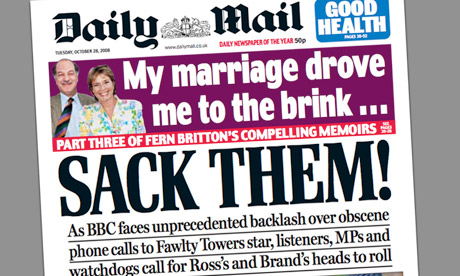by Holly Govey
In such a connected society, news of events around the world is available
at the touch of a button, and the influence of mass media has grown
exponentially with advances in technology. Yet often we do not stop to consider
the implications of the sources of our information or the motivations of the
authors who bring it to us.
Media enjoys a seemingly bidirectional relationship with the public, who
both influence and are manipulated by the way news is presented. Ostensibly
objective, the media attempts to present a controversial topic from different
angles in order to allow readers to formulate their own opinion about the
stories which are reported. Furthermore, in many democratic systems, it is the
role of the media to keep the public aware of what those in positions of power
are doing with their authority. Unfortunately however, news reports can be controlled and
manipulated by media figures, be it from a governmental source or by their
backers, causing the tone, description, and amount of coverage to form a single
narrative that conforms to set of standards and is biased towards a particular
view.
This notion
is exemplified by the recent coverage of the beheading of Western journalists
by IS militants, reported to have been used as a propaganda weapon to
compensate for the military losses they are suffering due to western air
strikes. Albeit gruesome, the beheadings are a way of creating an impression of
victory in order to demoralize their enemies and frighten the world into
submission. In this way, through the creation of stories which are dangerous to
report and sickening to read, the persecution of journalists has a particular
insidious impact. In addition, media representations of Government officials
and political parties have a direct impact on voting behaviour and amount to
huge shifts in public opinion, as highlighted through the changing perception
of the outcome of the Scottish referendum based on information received via the
media.
Historically,
warfare around the world has generated controversy over the role of media in
covering international affairs. Disputes about media coverage have led to the
exposure of the juxtaposition between the political impact of reports on public
opinion and the media’s concern with rapid communication of news. Furthermore,
the preoccupation of states with military matters, also conflicts with the
political assumptions of a full disclosure of information. The role of national
agendas within national media, compounded by the denial of physical access to
combat sites, has in the past rendered journalists unable to report objectively
and accurately on military issues. The Vietnam War is a significant example of
this notion, as a “credibility gap” was allowed to develop between the negative
media coverage and the more optimistic official announcements, resulting in a
growing rejection of the Government’s handling of the war.
More recently, media representations of the struggles in Iraq and Syria
have resulted in introducing the British public to the radical extremism of
Islamist militants, causing an increasing number of people to convert to Islam.
In addition, these reports have led to a polarization of opinions about Islam,
and other religious beliefs, which alienates both atheists and non-radical
devout Muslims in the UK.
The media has a direct impact on the values we hold, the beliefs we harbour
and the decisions we make. We must remember, therefore, that the information
presented to us is subject to a number of filters, under the control of a
“gatekeeper” who regulates the flow of information. When “gatekeepers” exercise
values such as transparency and honesty, the result is targeted and objective
information, otherwise gatekeeping can be used for personal gain and can result
in the distortion of public perception.


Comments
Post a Comment
Comments with names are more likely to be published.